Labour is right to forge more trade links with China – not doing so would be folly | Kerry Brown
Share:
From a ‘golden era’ to post-pandemic mistrust, the UK has had a turbulent relationship with the world’s second-largest economy.
In the last decade, Britain’s relations with China have been on a rollercoaster. In 2015, during the visit of Chinese leader Xi Jinping to the UK, then chancellor George Osborne was able to declare the two countries were in a “golden era”. He did this with the conviction that with a growing economy and rising middle class, China offered plenty of opportunities for Britain. But by 2022, Rishi Sunak had declared the “end of the golden era”. And in 2023, deputy prime minister Oliver Dowden labelled China Britain’s greatest economic security threat, to align closer with the position of the US, and through fears of deeper Chinese espionage and interference in the outside world. Seldom had a diplomatic boom-bust cycle happened so rapidly and so completely.
In view of extremes such as these, to see a return to unvarnished, largely conventional engagement looks like a revolution. In the past, Rachel Reeves turning up in Beijing for a high-level economic dialogue, as she did over the weekend, would have attracted little notice. China is, after all, still the world’s second largest economy and accounts for about a fifth of global GDP. Its middle class, despite recent domestic economic turbulence, constitutes one of the most dynamic and sought-after consumer groups on the planet. But in 2025, such a visit looks like radical action because of the dramatic deterioration that occurred in the final years of the Conservative administration.
Kerry Brown is director of the Lau China Institute, King’s College London. He is the author of The Great Reversal: Britain, China and the 400 Year Contest for Power.






















